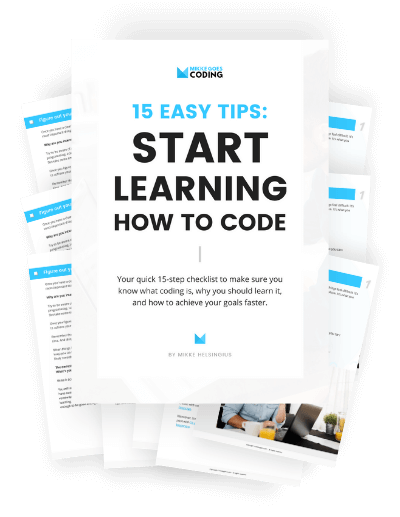So you’re thinking about starting to learn how to code? Congrats!
Or perhaps you’ve already started but you’re not sure how to find the best online resources?
When you’re just getting started, the amount of courses out there can feel overwhelming. How do you know where to find the best courses for beginners to start learning coding for free?
The truth is: only a handful of the coding courses out there are really beginner-friendly. And when you’re a beginner, you want to try out a few tools and programming languages before investing in paid learning resources, right?
Well, that’s what I’m here to help you with. In this post, I’ll walk you through the best websites for beginners to learn to code for free.
By the time you finish this post, you’ll know where to start learning without wasting your time or money on poorly constructed or expensive courses.
Before we start, I’d recommend that you read my post on what programming language you should learn first. This will help you find the best free coding courses much easier in this article.
Let’s jump right in!
Here are a couple of other helpful articles you may be interested in, too:
- 8 Things to Know Before Learning Programming
- What Do Web Developers Do Exactly?
- Learning Programming: Online Coding Courses vs Books
Please note: This post contains affiliate links to products I use and recommend. I may receive a small commission if you purchase through one of my links, at no additional cost to you. Thank you for your support!
The best websites to learn coding for free
Here are the best websites to learn coding for free we’ll go through in this post:
Make sure to share this post with others, and pin it to Pinterest for later! Thank you!

1: Codecademy

Codecademy is my #1 choice for getting started if you’re completely new to coding.
You can get a good basic understanding of several different programming languages and frameworks here. Just pick a course from the catalog you find interesting and you’re good to go!
Codecademy has a nice selection of courses for creating and deploying websites, learning JavaScript, Python, SQL, Ruby, or PHP, for example.
There’s lots of free content for you to get started with. Each course covers several lessons with smaller modules, where you have a small programming task or problem to solve.
The interface is very clear with a panel for the instructions, a console for writing your code, and an output terminal for running your code. If you make a mistake, you’ll get instant feedback and an indication about what you should take a closer look at.
As a matter of fact, I first started learning Python, HTML, and CSS at Codecademy back in 2016.
The courses I tried so far were really well structured. They start at the very basics and have a nice progression once you start to get the hang of it.
Read also: How to Choose Your First Programming Language
2: Udemy

Offering courses in other fields than programming, too, Udemy is one of the biggest, most diverse platforms out there.
As a matter of fact, anyone can create a course there and pass their skills to others! This can be seen in the endless number of different courses available.
Considering that each course on Udemy is a more or less independent entity, it’s a good idea to take a closer look at the reviews and the course curriculum before starting.
Udemy offers plenty of free courses, but most of the more in-depth content comes with a price tag.
However, they do have some pretty decent discount campaigns going on fairly frequently. So, if you’re not in a hurry, save your favourites in your wish list and practice some patience.
Udemy is definitely one of my favourite websites for learning these days. For example, The Complete Web Developer Course 2.0 was my first Udemy course, and it taught me more than any other coding course I’ve taken. It’s an all-in-one resource for anyone interested in learning skills and technologies used in web development and web design. Throughout the course, you will build a handful of real projects for your portfolio, too.
3: Udacity

Udacity offers a wide selection of individual courses, but also so-called nanodegrees. These are study programs consisting of courses aiming at developing specialised skills for specific field in tech.
In fact, Udacity cooperates with big players like Google, Facebook, and AT&T for developing courses that actually prepare students for jobs at these very companies.
Even though the nanodegrees require a subscription, some of the individual courses are free. I found a fantastic freebie called Introduction to Python Programming when I was new to coding. I was already learning Python at Codecademy and with Python Crash Course, and these two resources complemented each other perfectly.
4: FreeCodeCamp

FreeCodeCamp is an excellent place to start at if you have no previous experience with coding.
All of the content is freely available and well-structured – you’ll find a clear path through each section of the material. To get you acquainted with computers in general, they also have a great set of short video lectures and quizzes on computer science basics.
FreeCodeCamp also has a great, big community to get you connected with like-minded developers. Once you start learning with them, you can join their Facebook group to find fellow coders in your city!
5: Team Treehouse

Team Treehouse has a more project-oriented approach to learning coding. There’s more emphasis and focus on a final goal at the end of each learning path than on some of the other websites.
The free content is very limited, giving you just a little taste of each course in the library. After the first stage of each course you can unlock the rest of the content with a monthly subscription.
Currently the Basic Plan at Treehouse goes for $25 per month. Considering you get access to all courses and resources, it is still great value for your money.
If you’re not sure if its for you, use this link to get a FREE 7-day trial at Treehouse.
If you already have a good idea about what it is you wish to accomplish or create with coding, take a look at what they have to offer.
6: Pluralsight (Code School)

Pluralsight is a great next step to take once you’ve found an interesting language and learned the basics of it on Codecademy, for instance.
Pluralsight doesn’t just offer courses, but more extensive learning paths where you develop a deeper understanding of the specific subject, such as JavaScript or Ruby for example.
The content at Pluralsight is super comprehensive for each learning path. The quality of the video lectures is excellent and the instructors do a great job at explaining things so that even a total newbie can understand them.
If you’re new to Pluralsight, give them a go with this free 10-day trial.
7: edX.org

edX offers a wide variety of real, university-level courses, some of which are from MIT and Harvard.
Needless to say, the quality of the lectures is outstanding, with some of the best professors in the world teaching you how computers work and how you can make them do what you want.
While the course contents are free, there’s a fee if you’re interested in obtaining a certificate after completing a course.
As I mentioned before, it’s very helpful and useful to understand some Computer Science basics when you start learning coding. It just makes things easier and saves time for you.
Luckily, there’s a great course from Harvard on edX, Introduction to Computer Science or CS50. I found the course extremely helpful for wrapping my head around how binary code works and much, much more.
8: Learn Python the Hard Way

Last but certainly not least a real treat for anyone interested in learning Python! Apart from the websites above, this one is actually a book.
If you’re aiming at acquiring a good understanding of how the language works and what it’s capable of, Learn Python the Hard Way (or LPTHW) is definitely worth looking into. It’s also a great go-to for anyone who has never done any programming before.
The author presents the different topics about Python and its dynamics in a very thorough, consistent, and well-structured way. There are plenty of exercises, where you will definitely get a good idea about what you can do with Python.
After Learn Python the Hard Way you’ll be able to use the language for solving problems in projects of your own or apply your skills to another course or book!
You can either browse through the book for free online or buy yourself a copy at Amazon.
Recommended: 5 Reasons Why Python Is a Great First Programming Language
Final thoughts: The best websites to learn coding for free
Alright, there ya go! That’s it for the best websites to learn coding and web development for free!
No matter which website or course you choose, try to keep a clear goal on your mind during the entire process.
Be aware of the progress you make – you could keep a learning journal, for example. Don’t be too hard on yourself, remember to celebrate each little success moment you achieve!
Moreover, manage your time and stay structured by making at least some sort of a schedule and learning plan for yourself.
For more practical tips on how to make the most of your journey, check out my post with 10 tips for learning coding more efficiently.
Now, take a good look at some of the websites in this post, choose your favourite, and start learning! Let me know how it goes!
Also, feel free to browse through some great coding courses I recommend for beginner developers:
If you enjoyed this post with websites for learning coding for free, just drop me a line in the comments below!
P.S. If you found this article helpful, please share it with others, too! Thanks for your support!
Happy coding!
– Mikke







